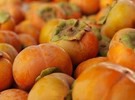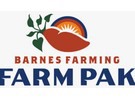Production is about to begin on organic persimmons in North Carolina. “We’re starting some small shipments in the next seven to 10 days and probably ramping up the first week of October,” says Josh Barnes of Farm Pak. “It’s a typical year. There are some cooler nights in the forecast so it looks like we’ll be starting right on schedule.” Harvest generally goes until mid-November.
The crop looks to be about average this year following a very dry spring and dry summer as well. Barnes notes that precipitation picked up in July but hasn’t fully caught up with the crop so Farm Pak has been irrigating to keep up. While fruit size is average, this year’s yield should be about the same.
 In the past five years, Farm Pak has increased its persimmon acreage by about 25 acres. “Every year we have another five to six acres we’re harvesting though our mature trees are still our highest yielders of course,” says Barnes. The crop is predominantly Fuyu though approximately five percent of it is Hachiya.
In the past five years, Farm Pak has increased its persimmon acreage by about 25 acres. “Every year we have another five to six acres we’re harvesting though our mature trees are still our highest yielders of course,” says Barnes. The crop is predominantly Fuyu though approximately five percent of it is Hachiya.
Ahead of the West Coast
Demand in turn has been strengthening as well as Farm Pak has become more and more developed in the marketplace. “We touched base with our buyers at the end of August or early September and they’re ready to go forward with this crop. We try to be a week or two ahead of some of the larger suppliers on the West coast so it gives us a chance to capture some of that market before they come in,” says Barnes.
Indeed, Barnes said Farm Pak may even see a stronger market this season thanks to its location. “We’re closer to the East Coast market whether it’s the Miami markets or the Northeast markets. That’s a tremendous advantage for us. This crop should sell pretty fast given the freight costs from California,” says Barnes.
As for pricing, Barnes notes that it could possibly see higher pricing for this crop, particularly following the increases in input and labor costs.
The crop will also likely start off with higher pricing, particularly given there’s no domestic supply carrying over, and then move back down towards November as the rest of the crop is harvested across the country.
 For more information:
For more information:
Josh Barnes
Farm Pak
Tel: +1 (252) 459-3101
[email protected]
www.farmpak.com
